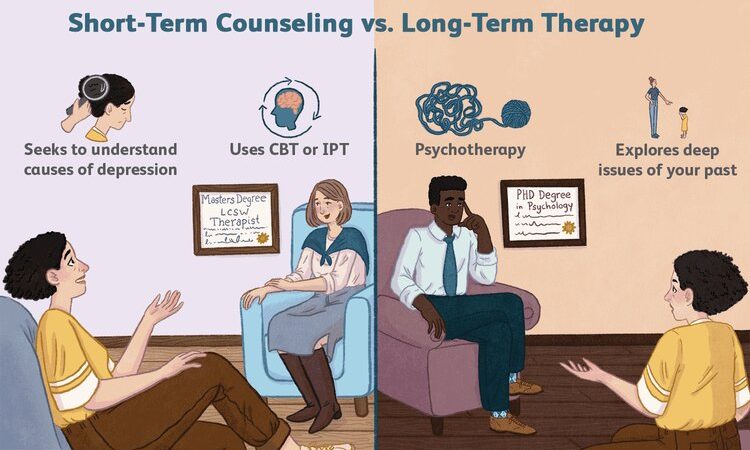Therapy VS Counseling: What’s the Difference?
Although the words “counselor” and “psychotherapist” are often used similarly. They have many parallels. They also have some significant distinctions. That’s why understanding therapy vs counseling is essential before starting any sessions.
For instance, counseling is often advised for particular problems and circumstances. Like addiction or grief, and may last anywhere from weeks to months.
Psychotherapy, on the other hand, focuses on previous difficulties that may be contributing to current ones. It often occurs for an extended period, either continuously or intermittently.
However, there is a considerable lot of overlap between the two kinds of treatments in practice. Keep on reading for our full breakdown on the differences between therapy and counseling.
Therapy vs Counseling 101
Let’s start with the basics.
While a therapist may offer counseling and psychotherapy, psychotherapy needs a higher level of competence than counseling.
Qualified professionals provide psychotherapy. Such as a psychiatrist or psychologist, a trained counselor, or a social worker.
While a psychotherapist is competent to offer counsel, a counselor might not have the required training and abilities to do so.
A therapist, on the other hand, may offer counseling for particular circumstances. And a counselor can work in a psychotherapeutic capacity.
Counseling
“Advisor” is the technical term for “counselor.” It entails two individuals cooperating to solve an issue. It’s a word that’s used for a variety of kinds of advice-giving. Financial planning and spiritual advice, for example, are both kinds of counseling.
If they are providing advice, just about anybody may call themselves a counselor. Counseling is also a word you may use to describe what happens in a relationship with a psychotherapist.
“Counseling” is a term used in the mental health field to describe a brief therapy that focuses mainly on behavior. It often focuses on a specific symptom or issue scenario and provides solutions and guidance for coping.
The counselor provides advice and support. The person attempts to manage their life better and adapt to change or hardship in this environment.
Marriage and family therapists, bereavement counselors, addiction and drug misuse counselors, and others. All of those are examples of counselors.
Therapy or Psychotherapy
On the other hand, “psychotherapy” is a relatively long treatment. One that focuses on obtaining understanding into persistent physical and mental issues.
It focuses on a person’s thinking processes. And how they may be affected by previous experiences, resulting in current issues.
In other terms, psychotherapy focuses on the underlying cause and core causes of present difficulties. This helps achieve long-term transformation and personal development.
There are many distinct kinds of treatment that come under the umbrella of psychotherapy. Including psychoanalytic psychotherapy, cognitive behavioral therapy, dialectical behavior therapy, and many more.
Choosing the Right Category for Your Needs
It’s beneficial to understand the distinctions mentioned above. As well as the backgrounds of particular providers and the methods they employ. All of that before selecting a therapist. Personal preferences, accessibility, and insurance coverage may all play a role in the decision.
However, the most crucial step is to locate a therapist you can trust. A person’s degree of trust in their behavioral healthcare professional is the most critical factor, and it can determine whether or not treatment will be effective.
Before you know which kind of treatment is right for you, you may need to speak with a therapist or schedule a few sessions.
For example, it may be challenging to determine whether you are dealing with a short-term, restricted issue in certain circumstances. In this case, you may best address it with therapy. Or whether the present problem is the result of events or experiences in your past.
Psychotherapy for Adults: How to Find the Right Professional
The distinction between the appropriate and incorrect therapist or counselor for you will not be determined by the letters after their name. It’s all about if you’re at ease with them and like their personality and approach to treatment.
It may take trial and error to discover the right therapist for you since it’s similar to dating.
You may have to suffer through a few unpleasant sessions before you find a match. When feasible, visit a therapist’s or counselor’s website. Many practitioners go to great lengths to let their personalities come through.
Research Factors
When we’re searching for a therapist, you should ask yourself, “Which provider will assist me in developing a solid therapeutic connection that will bring me to where I want to be?
The question is, who will connect with me in a unique manner that will assist me?
It’s conceivable that the search will entail filtering down potential therapists and counselors based on their degrees. But, it’s also possible that it won’t.
Although therapists need to be educated, trained, and current on current techniques. A competent therapist is so much more than their degree and background.
It’s not uncommon to discover someone who seems to be ideal on paper. And has even produced many articles on the topic you’re having trouble with. But, when you take a seat in their office, the rapport isn’t there.
Knowing about the various levels and kinds of mental health programs may help you narrow down your options. But ultimately, finding the perfect match for you is the essential factor.
Behavioral Therapy: Unlocking Your Psyche
Taking the first step towards taking care of your mental health takes a lot of bravery. Adding in the complication of figuring out the different types of therapy and counseling is no doubt caused additional stress to the whole process.
We hope that our guide has shed some light on the intricacies of therapy vs counseling and helped you make a more educated choice on which kind of professional to see.
And, if you liked our article, then you’ll love checking out our additional tips and tricks. All of them will be available in our health and lifestyle sections.

















